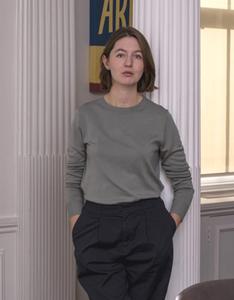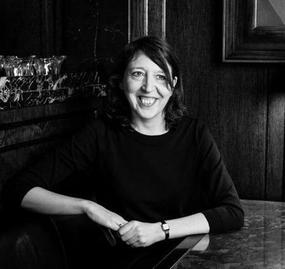
|
|
| Sally Rooney (photo: Kalpesh Lathigra) |
|
Sally Rooney, who lives in Dublin, is the award-winning author of Conversations with Friends and Normal People, and was nominated for an Emmy for her work on the television adaption of the latter. Here, Farrar, Straus and Giroux publisher Mitzi Angel, the editor of Rooney's books, discusses Rooney's third novel, Beautiful World, Where Are You, which centers on four friends searching for meaning through the lens of their relationships. Beautiful World, Where Are You is available now.
You've published all three of Rooney's novels; what has it been like to work with her over the course of her career?
Reading Sally's first novel was a kind of revelation. It felt like a new voice; there was something so unexpected and winning about her voice that really captured my attention, and with so much humor, too. I don't think either of us quite expected the enormous success that followed her first two novels, but it has been a wonderful thing to see how much she has touched other people with her writing, and how much meaning people have found in her books. And I mean people of all different ages, not just the so-called "millennial" generation.
 |
|
| Mitzi Angel (photo: Oliver Holms) |
|
Did anything stand out to you in Beautiful World, Where Are You in contrast to Rooney's earlier novels?
It's longer for a start, more ambitious. Formally, it's more inventive. I love the way she moves between the correspondence between two friends, Alice and Eileen, and brings in other kinds of narration that she plays around with in terms of conveying perspective. She's asking: What kind of perspective do we have of other people? What is the nature of the contract between one person and another? And how are we all to conceive of a future when the world feels so precarious? That's very poignantly addressed, and the whole book feels more expansive as a result.
I found Beautiful World, Where Are You was full of the sense of the precariousness of our lives. Of course, it's also about living life to the full and experiencing relationships to the full, and feeling love, and feeling friendship, but always with that sense of fragility, and a sense of the appreciation of beauty, and how important it is to be able to see that, be alert to it, despite all the sadness and difficulties in the world. She also brings up the pandemic and corresponding lockdowns towards the end of the novel, very delicately but poignantly. In that last year as she was finishing the novel, which was delivered just as the pandemic began to upend all our lives, she'd been taking in what was happening around her. And she found a way to bring that into the novel without insisting upon it.
The four main characters in Beautiful World, Where Are You fit the official definition of "millennial." But you mentioned that you feel strongly that this novel, like Rooney's past works, will appeal to readers of all ages.
I think about it like this: you read a book like Middlemarch when you're young. And Dorothea is also young, in her 20s and of marriageable age and decides to marry this horrible man. We read this novel about the choices we make in life and what effect they have on us, and what they lead to; it's about the human spirit and about trying to make one's way. Even when I re-read that novel when I was older and thought on how much younger Dorothea was than me at that point, I never thought of that novel as being about a young person. It's just about a person, and people, and making their way through their lives.
That's literature, as Sally's work is. She is writing with great insight [about] people in their 30s, or late 20s, and bringing us the world through these characters. I think that someone in their 70s or someone aged 14 is able to appreciate that in her work.
Of course, it's easy to say, yes, she's very good at capturing the way people talk now, or the way a 28-year-old might text her friend--this kind of easy, fluid motion between text messaging and spoken English and how the two inform each other. All of that is present, and she's highly attuned to the Internet, for example. But that doesn't mean that her subject is "the Internet" or there's anything circumscribed about the book.
What do you make of the novel questioning the role of the novel itself in modern life?
She plays with shifts in perspective in the novel and also writes very amusingly about the job of being a novelist. It's funny that the book is about work in some ways, the value of work, how we value work, what is supposed to be worth something. Eileen is an editor, and Simon has a more fancy job doing his stuff with a lanyard around his neck and Felix works in a warehouse. Alice then does this rather strange thing, which is write these books, and then finds herself the center of attention (which she's not always keen on being), and it's quite fun to see that play out in the novel, even as it is a great source of anxiety for her and difficult for the people around her.
It's a novel that is aware of novels. In a way, as Alice and Eileen explore in their letters, it questions the worth of novel writing. It may be related to the question in the title. Alice kind of says, what's the point of writing fiction when there is so much misery in the world? And the book is a way of trying to answer that question, even as it knows it is never going to find an answer. It's a celebration of art. The book is about art, but it also acknowledges that it's always very hard to assign value to it.
You have referred to the title of Rooney's third novel as "not a question, but a prayer," which has really stuck with me. Can you explain what you meant by that?
I think the title reaches for an answer it might not find. And I think the same is true, perhaps, for the book as a whole. The book is searching: How is it that we can never quite see clearly? How it is that it is so hard to get along with one another? So hard to stay close? How is it that our lives can be both so connected and yet so different from one another? How is it that we can live in this world and go to the store and know that, as Alice knows, there are goods on sale there that have been produced thousands of miles away under miserable circumstances, brutal labor conditions, and so on? And still buy the stuff and go home and have a glass of wine and make your food? How is it that these things are the way they are?
The book is very good at asking those questions without necessarily providing answers. The answer perhaps lies in that hidden beauty, the beauty that we can't deny in life. What strikes me is that there's this kind of plea in the novel for a better world, for a beautiful world. The novel isn't certain that it's there, but there is this belief somehow, present in the writing and in the characters' own lives and attitudes, that there is joy to be found, and there is beauty to be found, and that takes on a kind of spiritual dimension. I do love the title. It feels quite sad, in a way, but it also feels beautiful. --Kerry McHugh

